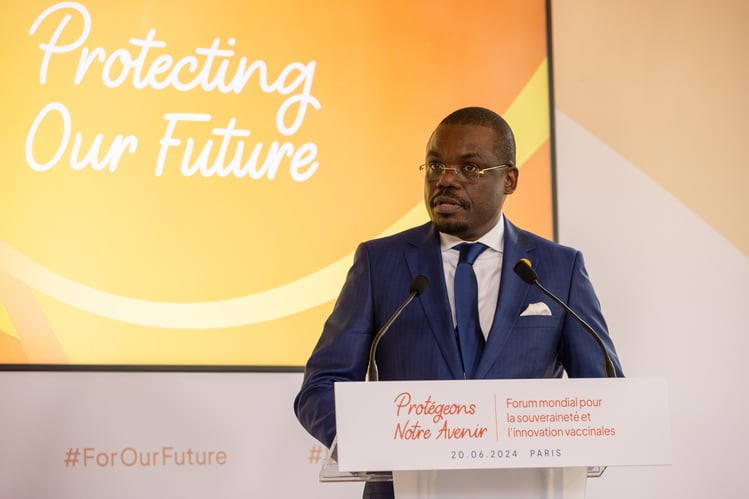In a world where pathogens ignore borders, our global healthcare system continues to draw lines. It creates a North-South divide, separating those with access to life-saving vaccines from those without. This harsh reality was the driving force behind the Global Forum for Vaccine Sovereignty and Innovation, held on June 20, 2024 in Paris.
This event, co-organized by the African Union and GAVI, the Vaccine Alliance, marked a crucial moment in the fight for global health equity. This article explores the 3 key aspects of this historic forum: the alarming state of global immunization, the revolutionary initiatives announced and, finally, the prospects for a more equitable health future.
Alarming observations prompt action:
The emergency of the forum was underlined by an startling statistic: currently, Africa produces just 0.2% of the world's vaccines. This glaring disparity has left the continent vulnerable to health crises and dependent on external sources for essential vaccinations. The forum also addressed the twin threats of climate change and antimicrobial resistance, which disproportionately affect low-income countries.
The Greenway Foundation (GWF for Greenway Foundation) is honored to have participated in the Global Forum for Vaccine Sovereignty and Innovation, in collaboration with the African Union and GAVI, the Vaccine Alliance. Every day of inaction means lives lost. We can no longer afford to wait," said Pierre-Yves Roizot, President of GWF.
This feeling resonated throughout the forum, where world leaders, health experts and philanthropic organizations came together to address one of the most pressing issues of our time: equitable access to vaccines.
This feeling resonated throughout the forum, where world leaders, health experts and philanthropic organizations came together to address one of the most pressing issues of our time: equitable access to vaccines.
Therefore, in response to this global health emergency, the forum was not only a forum for discussion, but also a lever for concrete action. It gave rise to ambitious initiatives aimed at radically transforming the global immunization landscape.
From promises to deeds: Revolutionary initiatives launched at the Forum.
One of the most important reveals of the day was the launch of the GAVI replenishment cycle for 2026-2030. This ambitious program aims to protect 500 million children and save more than 8 million lives through vaccines.
The second, and perhaps the most revolutionary of the forum, was the launch of the African Vaccine Manufacturing Accelerator (AVMA). This is a $1.1 billion fund: a monumental step towards vaccine sovereignty for the African continent. "This will help us produce 60% of our vaccines in Africa by 2040," proudly announced Jean Kaseya, Director General of the African Centers for Disease Control and Prevention.

With these statements, the forum highlighted the power of international cooperation. They offer a glimpse of a more equitable future for global health.
Looking ahead: the way forward
In this context of global cooperation, the Greenway Foundation has reaffirmed its commitment to the Bill & Melinda Gates Foundation. Their collaboration aims to propel the Sustainable Development Goal (SDG) on health to new heights. "This isn't just about vaccines," explained Melinda Gates. "It's an opportunity to drive innovation, create skilled jobs and strengthen healthcare systems as a whole. "The potential impact goes far beyond healthcare.
GAVI also plans to expand its malaria vaccination program, introduce a dengue vaccine and extend preventive campaigns for other climate-sensitive diseases. In addition, vaccines play a crucial role in the fight against antimicrobial resistance. By preventing bacterial infections, they directly reduce the use of antibiotics. Today, it is estimated that widespread vaccination in GAVI-eligible countries could reduce antibiotic use by more than 60 million doses a year.
As the forum came to a close, a sense of guarded optimism prevailed among participants. The message was clear: the time for action is now. The initiatives launched have the potential to transform the global healthcare landscape, particularly in Africa. As Pierre-Yves Roizot so aptly put it, "Small streams make big rivers."
However, experts warn that we have a long way to go, but with every step, we're getting closer to a world where pathogens may not discriminate, and neither will our global healthcare system.
However, experts warn that we have a long way to go, but with every step, we're getting closer to a world where pathogens may not discriminate, and neither will our global healthcare system.

.jpg?width=300&name=RS51706__4BL4716%20(1).jpg)